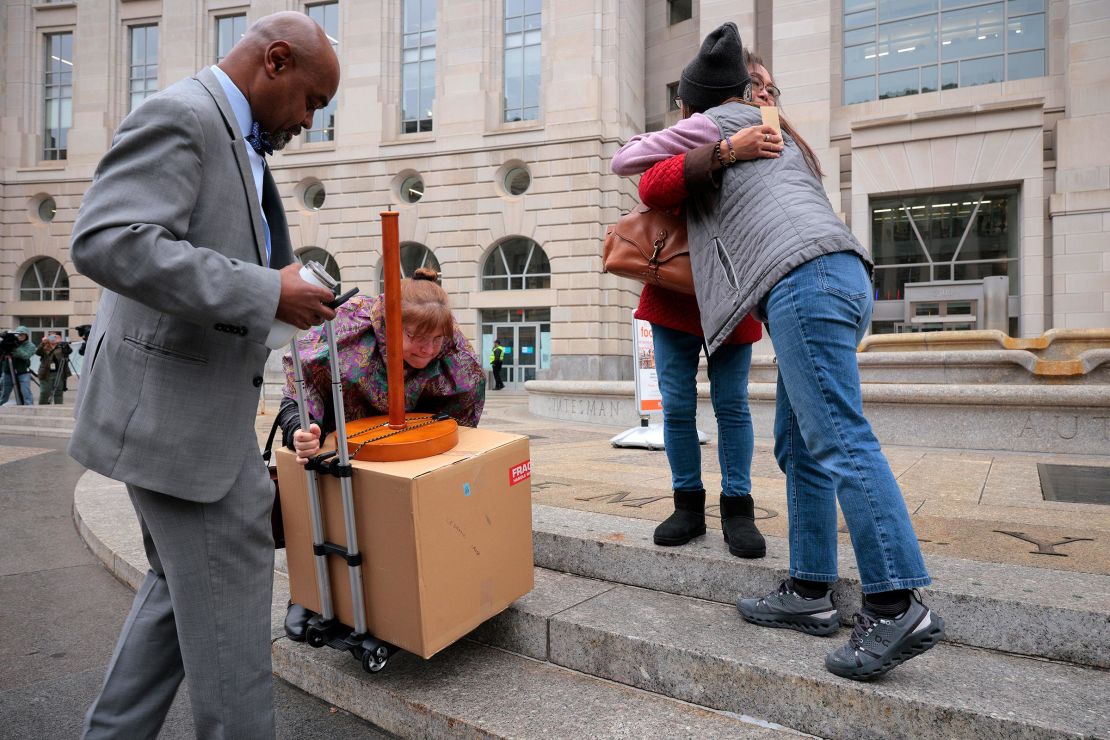Editor’s Note: Elon Musk gave Republicans hundreds of millions of dollars to retake control of Washington, DC. President Donald Trump gave Musk the job of dismantling much of the federal government. This is Part 2 of an in-depth, contemporaneous look at the first 100 days of Trump’s second term.
CNN
—
When the man in black charges onstage swinging a chainsaw while he whoops and hollers, the moment could be mistaken for a scene from “The Hunger Games.” The screaming crowd makes it seem even more so.
“This is the chain saw for bureaucracy!” Elon Musk shouts, grinning behind dark sunglasses and beneath a MAGA black baseball cap.
The spectacle by the richest man in the world at the Conservative Political Action Conference is a sensation, and not just because Musk spent more than $290 million of his own money to help push Donald Trump and other Republicans to their landmark wins last fall. Trump has given Musk the job of doing what so many conservatives have craved for so long: hacking the federal government to pieces.
The Department of Government Efficiency, or DOGE, was initially conceived as an effort under the command of both Musk and his fellow entrepreneur Vivek Ramaswamy. Trump said the group’s mission was “making changes to the Federal Bureaucracy with an eye on efficiency and, at the same time, making life better for all Americans.”
It’s an oddly bureaucratic description for the coming carnage. As the DOGE team goes to work, headlines emerge of Musk and a group of young, technology whizzes (including a 19-year-old who goes by the moniker “Big Balls”) roaming the halls of government, demanding access to files, prying into computer records, and rapidly pushing tens of thousands of federal workers to consider resigning or risk being fired.
At Yosemite National Park, employee Andria Townsend is terminated along with hundreds of other National Park employees in what they are calling the “Valentine’s Day Massacre.” She sees calamity lurking in the coming collision of understaffed facilities, decreased maintenance and the massive vacation crowds. “Moving forward, I think it’s just going to make life even harder and less efficient for the people working in the federal government right now, which seems to be the opposite of what the administration is trying to do.”
At the Department of Veterans Affairs, Latisha Thompson watches DOGE’s cuts with trepidation as reports trickle in from Trump supporters in the government who are shocked to find they too have been given pink slips.
“This will have consequences in every community,” Thompson says. “Veterans will wait longer for the medical care that they need, Social Security claims will be delayed, food safety inspections will be cut back. We will have disaster response that will just be gutted.”
DOGE makes foreign aid an early target. Sending tax dollars to help other people in other nations has never been particularly popular with American voters, even though it accounts for less than 1% of the federal budget.
Dead center in DOGE’s sights is the US Agency for International Development, with a long pedigree in providing education, health care, expertise, food and other services to struggling communities around the world. Many experienced political hands see it as a leading edge of America’s “soft power,” promoting goodwill and democratic ideals at bargain prices. “Development is a lot cheaper than sending soldiers,” former Secretary of Defense Robert Gates once famously said.
But DOGE paints USAID as a hotbed of corruption, with taxpayer funds going to contractors in sweetheart deals, given away or stolen. Musk, without evidence, calls it a “criminal organization.” Trump says it is “run by a bunch of radical lunatics.”
Administrators are put on forced leave. Workers are seen walking out with cardboard boxes of their belongings. Aid facilities around the world are shuttered overnight, leaving potentially lifesaving deliveries of food and medicine spoiling on distant docks. A global network of American influence built over 60 years is in shambles.

A longtime aid worker who lost her job when the contractor she worked for was cut off does not want to be identified. But Jane, as we will call her, says her colleagues could barely comprehend the action. “I think they were heartbroken for the people in the countries that they were working in — seeing programs completely shut down on 24 hours’ notice. I don’t think Musk cared. I don’t think Trump cared.” Jane sighs and adds, “I think people were heartbroken being called criminals for the life’s work that they did.”
That despair might be not a bug, but a feature.
Right before the fall election, a key contributor to Project 2025 spoke at an event hosted by the ultra-right-wing think tank Center for Renewing America, of which he was president. Russell Vought’s words, initially brought to light by ProPublica, offer an insight into how unmercifully some conservatives wanted to force federal workers into submission and retreat.
“We want the bureaucrats to be traumatically affected,” Vought said in October. “When they wake up in the morning, we want them to not want to go to work, because they are increasingly viewed as the villains. We want their funding to be shut down.” Then, in case anyone missed the point in the giggling audience, he added, “We want to put them in trauma.”
Vought was director of the US Office of Management and Budget in Trump’s first term, and despite Democrats calling him Trump’s “most dangerous nominee,” Republicans have confirmed him to the job again.
When Vought is called before the Senate Budget Committee just after resuming his work, Democratic Sen. Tim Kaine of Virginia grills him about the “gleeful speech,” asking whether Vought honestly wants air traffic controllers, infant formula safety inspectors and drug enforcement officers traumatized. Vought repeatedly squirms and answers, “No.”
The coup de grace comes as Kaine notes Vought’s own mother was a civil servant — a schoolteacher — and recites even more of the budget boss’s own words back to him. “We want to take all these programs that help everyday people who are struggling and cut them because they are ‘woke and weaponized.’ Those are your words, not mine,” Kaine says.
Still, when Vought leaves the hot seat, he goes right back to helping DOGE slash through the Internal Revenue Service; the National Institutes of Health and the Centers for Disease Control and Prevention; the CIA; the Social Security Administration; and Voice of America, which has provided news and free speech to beleaguered nations for generations. DOGE professes to have found tens of billions of dollars of “waste, fraud and abuse.” That is nowhere near the $2 trillion Musk initially said he’d save taxpayers, but, if accurate, it’s still a big ticket.
However, when members of Congress and journalists press for details, many of the claims crumble. The DOGE website, billed as its “wall of receipts,” seems as flimsy as paper.
An ICE contract, canceled by DOGE and listed as $8 billion in savings, turns out to be for at most $8 million, a mistake The New York Times says should have been easily noticed since the lower number comes close to the entire annual budget for ICE. A vendor tells “PBS Newshour” that his company was listed as having a federal contract for nearly $10 million but it was for only $100,000 and the deal was never signed. Some contracts are listed multiple times on the website. Supposed savings posted by DOGE are repeatedly revised, exaggerated or removed when they prove inaccurate.
DOGE’s chain saw approach leads to other embarrassments, too. Dozens of workers at the National Nuclear Security Administration are terminated in a wave of layoffs at the Energy Department. Then, when the administration realizes these are the people who oversee the nation’s nuclear weapons, they are quickly recalled. A free health care program for first responders to the 9/11 attacks is left reeling by on-again, off-again reports that its funding may be frozen.

At a CNN town hall, Democratic Rep. Jahana Hayes of Connecticut says she wants to hear about real waste, but many in her party believe Musk is leading a secretive, dangerous and deeply flawed process. “What we’re talking about is burning down the house instead of taking out the garbage,” she says.
Musk and company push on, seeking (and in many cases reportedly getting) access to tax returns, Social Security numbers and other sensitive information belonging to millions of regular Americans. As a rule, anyone in the way is pushed aside, reassigned or fired. DOGE taps into computer systems the Treasury Department uses to make payments. Considering Musk was not elected to any role — he is a special government employee and, as such, not subject to the protocol or checks of a typical federal worker — some see this as akin to the friend of a bank teller getting access to all the customers’ accounts and credit card numbers.
“Terrifying,” says Democratic strategist and CNN contributor Paul Begala. “You’re talking about literally trillions of dollars. The crown jewels of the federal government are the nuclear arsenal and the Treasury payment systems.”
Ramaswamy is nowhere to be seen, having left DOGE right after Trump was sworn in. Ramaswamy, now running for governor of Ohio, denies rumors that disagreements with Musk played a part in his departure, but he tells Fox News: “We had different — and complementary — approaches. I focused more on a constitutional law, legislative-based approach. He focused more on a technology approach.”
Under pressure over DOGE’s activity, Trump invites journalists into the Oval Office for a rambling session with Musk.
“Some of the things that I say will be incorrect and should be corrected,” Musk says as his young son sits on his shoulders and lounges on his head. “Nobody’s going to bat a thousand … we will make mistakes, but we will act quickly to correct any mistakes.” Then he promptly repeats what is already a widely debunked claim about $50 million worth of condoms being sent to Gaza.
Trump praises the unproven “billions and billions” in savings. Musk says, “The people voted for major government reform, and that’s what people are going to get.”
Both brush off the question so many watchdog groups have raised: How can Musk, whose companies have billions in government contracts, not have a conflict of interest in overseeing precisely that kind of spending?
Debates break out on news shows and podcasts over whether Musk is becoming more of a liability to Trump than an asset, and whether he is approaching his own termination date.

Former Trump adviser Steve Bannon, who has raised alarms about Musk’s role, shares with Politico a reason the president might want to keep the owner of X close. “He (Musk) holds the two tactical nuclear weapons of modern politics, which is unlimited cash and a social media platform that’s not just ubiquitous, but also he can deem who’s heard and who’s not heard.”
It’s a keen observation, because as public alarm rises over Musk’s role, some critics are expressing themselves in dramatic ways. Across the country, attacks are reported on Tesla dealerships, charging stations and privately owned cars. At a Nevada Tesla repair business, police say an unidentified attacker shoots and sets fire to cars, and the word “RESIST” is spray-painted across the shop’s front door. Gunfire, arson and vandalism incidents pop up around the Tesla brand in Kansas, Oregon, Massachusetts, Florida, South Carolina, Colorado, Texas and Washington, DC.
Team Trump, which has purposely upended the lives, careers and personal finances of thousands of federal workers with seemingly not a moment of concern, rushes to help the beleaguered billionaire.
“Those responsible will be pursued, caught, and brought to justice,” the FBI’s new director, Kash Patel, says while announcing a task force to “crack down on violent Tesla attacks.” When a 24-year-old Colorado man is accused in one case, US Attorney General Pam Bondi says she will prosecute him with eyes on a 20-year sentence.
“When I looked at those showrooms burning and those cars … exploding all over the place,” Trump says from the Oval Office. “You didn’t have that on January 6 … these are terrorists.”
Trump’s secretary of commerce, Howard Lutnick, urges people to buy Tesla stock, astonishing ethics analysts by using his public office to promote a private company over its rivals. Trump, for his part, converts the White House into a makeshift car lot. Posing with Musk and a line of new Teslas, Trump declares he’s going to buy one from his uber-wealthy friend.
“I think he’s been treated very unfairly by a very small group of people,” Trump says, “and I just want people to know that he can’t be penalized for being a patriot.”
None of it has erased the steep tumble of Tesla’s stock value, which is mesmerizing Wall Street. Musk complains on X, “Tesla just makes electric cars and has done nothing to deserve these evil attacks.” Nevertheless, some Tesla owners start slapping stickers on the back of their cars saying things like “I bought this before Elon went crazy” and “Mars is ready Elon. Go. And take Trump with you.”
“I have rarely if ever seen any change of perception as dramatic as this one,” says CNN’s chief data analyst, Harry Enten, as public approval ratings for the electric car impresario drive off a cliff.
Many on the right remain delighted with the work of DOGE. For decades, these voters have chafed at the inability of Republican leaders to rein in what they are convinced is a lazy, corrupt, incompetent bureaucracy; a “deep state” that thwarts their political ambitions while taking their hard-earned dollars. Trump supports that sentiment, and insiders say he truly enjoys hanging out with Musk, whether at Mar-a-Lago, at a rocket launch, or while stirring up the MAGA base with speeches about a new age in which the government truly works for them.
Nonetheless, the broship’s philosophy of smashing everything first and figuring out if they went too far second is risky. It is unclear what the government will look like, or cost, or be able to do once the demolition is complete. It is equally uncertain how much it will take to restart some of these programs if Trump or a future president chooses to do so. And while many disruptions in service will likely not affect the super-rich, they may be life-altering for working Americans living paycheck to paycheck and relying on government programs.
Some of those voters will soon start appearing online and in news stories to say they voted for the 47th president, but they did not vote for this.
CNN’s Kaanita Iyer contributed to this report.
